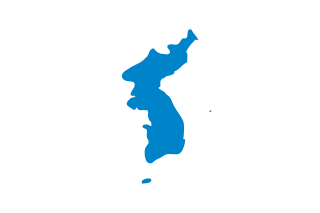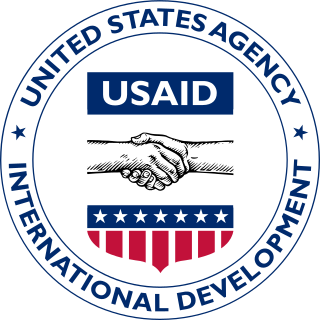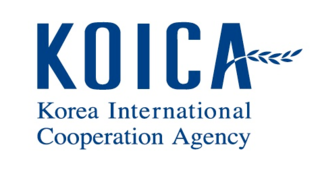
The Korean War was fought between North Korea and South Korea; it began on 25 June 1950 when North Korea invaded South Korea and ceased after an armistice on 27 July 1953. North Korea was supported by the People's Republic of China and the Soviet Union while South Korea was supported by the United Nations Command (UNC) led by the US.

Korean reunification is the hypothetical unification of North Korea and South Korea into a singular Korean sovereign state. The process towards reunification of the peninsula while still maintaining two opposing regimes was started by the June 15th North–South Joint Declaration in June 2000, was reaffirmed by the October 4th Declaration in October 2007 and the Panmunjom Declaration in April 2018, and the joint statement of United States President Donald Trump and North Korean leader Kim Jong Un at the Singapore Summit in June 2018. In the Panmunjom Declaration, the two countries agreed to work to officially end the Korean conflict in the future.

The Charter of the United Nations (UN) is the foundational treaty of the United Nations. It establishes the purposes, governing structure, and overall framework of the UN system, including its six principal organs: the Secretariat, the General Assembly, the Security Council, the Economic and Social Council, the International Court of Justice, and the Trusteeship Council.

The United States Agency for International Development (USAID) is an independent agency of the United States government that is primarily responsible for administering civilian foreign aid and development assistance. With a budget of over $50 billion, USAID is one of the largest official aid agencies in the world and accounts for more than half of all U.S. foreign assistance—the highest in the world in absolute dollar terms.
Philanthropy is a form of altruism that consists of "private initiatives for the public good, focusing on quality of life". Philanthropy contrasts with business initiatives, which are private initiatives for private good, focusing on material gain; and with government endeavors that are public initiatives for public good, such as those that focus on the provision of public services. A person who practices philanthropy is a philanthropist.

Dag Hjalmar Agne Carl Hammarskjöld was a Swedish economist and diplomat who served as the second Secretary-General of the United Nations from April 1953 until his death in a plane crash in September 1961. As of 2024, he remains the youngest person to have held the post, having been only 47 years old when he was appointed. He was a son of Hjalmar Hammarskjöld, who served as Prime Minister of Sweden from 1914 to 1917.

General James Alward Van Fleet was a United States Army officer who saw service during World War I, World War II and the Korean War. Van Fleet was a native of New Jersey, who was raised in Florida and graduated from the United States Military Academy. He served as a regimental, divisional and corps commander during World War II and as the commanding general of United States Army and other United Nations forces during the Korean War.
Peacemakers was an American pacifist organization founded following a conference on "More Disciplined and Revolutionary Pacifist Activity" in Chicago in July 1948. Ernest and Marion Bromley and Juanita and Wally Nelson largely organized the group. The group’s organizational structure adopted a multidivisional organizational structure with a loose hierarchy, prioritizing local committees including but not limited to the Tax Refusal and Military Draft Refusal Committee.

MS Jutlandia was contracted by and built for the East Asiatic Company (EAC) in 1934, as a combined passenger and cargo ship at EAC's Nakskov Shipyard, Denmark. Following an extended operational life in which she also served as a hospital ship and a royal yacht, she was finally decommissioned in 1965.

United Nations Command is the multinational military force established to support the Republic of Korea during and after the Korean War. It was the first international unified command in history, and the first attempt at collective security pursuant to the Charter of the United Nations.
Former Iranian president Mohammad Khatami introduced the idea of Dialogue Among Civilizations as a response to Samuel P. Huntington's theory of a Clash of Civilizations. The term was initially used by Austrian philosopher Hans Köchler who in 1972, in a letter to UNESCO, had suggested the idea of an international conference on the "dialogue between different civilizations" and had organized, in 1974, a first international conference on the role of intercultural dialogue with the support and under the auspices of Senegalese President Léopold Sédar Senghor.

The Korea Foundation is a non-profit public diplomacy organization established in 1991 to promote a better understanding of Korea and strengthen friendships in the international community. The foundation carries out various projects for exchange between the South Korea and foreign countries to cultivate mutual understanding.

Yōhei Sasakawa is chairman of The Nippon Foundation, the World Health Organization Goodwill Ambassador for Leprosy Elimination, and Japan's Ambassador for the Human Rights of People Affected by Leprosy. His global fight against leprosy and its accompanying stigma and social discrimination is an issue to which he has remained highly committed for more than 40 years. As chairman of The Nippon Foundation, Japan's largest charitable foundation, he guides public-interest activities in modern Japan. Sasakawa received his degree from Meiji University’s School of Political Science and Economics. Sasakawa's father was businessman, politician, and philanthropist Ryōichi Sasakawa.

The Korea International Cooperation Agency was established in 1991 by the Ministry of Foreign Affairs of South Korea as a governmental organization for Official Development Assistance (ODA). KOICA's goal is to enhance the effectiveness of South Korea's grant aid programs for developing countries by implementing the government's grant aid and technical cooperation programs. KOICA is led by three-year-term president of the board who is appointed by the President upon the recommendation of Foreign Minister.
In December 2009, the United Nations General Assembly adopted resolution 64/134 proclaiming the year commencing 12 August 2010 as the International Year of Youth.

Geoje-do POW camp was a prisoner of war camp located on Geoje island at the southernmost part of Gyeongsangnam-do, South Korea. It is considered the largest of the UNC established camps.

The Korean Red Cross, fully the Republic of Korea National Red Cross, is a humanitarian organization that provides emergency assistance, disaster relief and education inside South Korea. It is the designated South Korean affiliate of the International Federation of Red Cross and Red Crescent Societies.

Saejowi (Korean: 새조위), also known as Saejowi Initiative for National Integration, operates in Seoul, South Korea, as a nongovernmental organization (NGO) that assists North Korean defectors with settlement in South Korea. Saejowi sponsors programs that provide medical support, job training, and other educational opportunities in order to aid with defector adjustment to South Korean society. Additionally, Saejowi works to encourage civil involvement in the Korean reunification movement, especially among the defector community. The organization hosts programs that facilitate open communication between South Koreans and defectors from North Korea. It has previously worked with the Korean Ministry of Unification, Korea Hana Foundation, and the Community Chest of Korea.

Venerable Pomnyun is a Seon master, author, and activist.
















